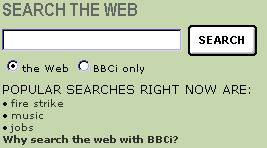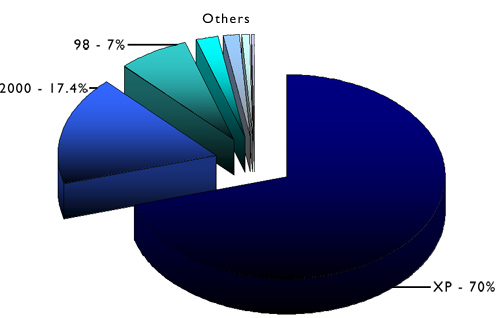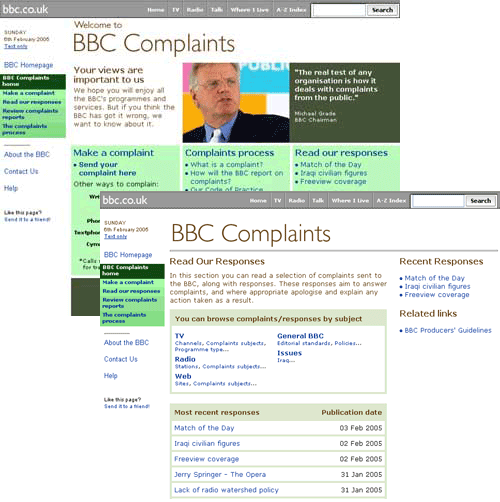Blogging at the BBC: Part 6 - The upside of blogging from the inside
I've been looking at the way the BBC has gradually integrated blogging as a medium into their website, and reflecting on several years spent working at the BBC whilst personally frequently blogging about that work.
Today I wanted to focus on what, for me, have been the positive effects of blogging. I began really attracting visitors to the site with my 2003 article "A day in the life of BBCi Search".

One of the most beneficial effects for that for me professionally, however, was not so much that my site got known, but that through my referrer logs I could see which sites had linked to me. If someone linked to me, it probably meant their blog or site covered a similar topic or area of work to mine - which at the time was almost exclusively to do with search engines.
With a judicious use of the 'subscribe' bookmarklet from Bloglines, which I discovered in August 2003, I was able to rapidly assemble a fantastic reading list covering search engines, information architecture, application design and usability. This, in turn, was reflected in what I blogged about, and formed a virtuous circle.
My blog also meant that I started being invited to give presentations about my work with the BBC's search engine and taxonomy outside of the BBC. For each of these I produced a new set of slides, and some slightly different content, which meant again that I blogged about it, which generated more invitations to speak, and so on.
People have often asked me whether I cleared what I wrote with my managers or with the BBC New Media comms team. For example after publishing the article "The software used to access the BBC homepage" someone inside the BBC emailed me and asked how I had managed to get permission. The truth was, in fact, that I hadn't sought anyone's permission, and I don't recall ever doing so about a post on currybetdotnet.

That doesn't mean of course, that I just published whatever I fancied. My first unwritten rule was that:
I would not write anything that I felt was commercially sensitive - indeed there were a couple of projects I worked on at the BBC that I never once mentioned on currybetdotnet because of their sensitive nature. In fact, that gives me a slight issue now, because on my CV I claim to have expertise in a couple of areas, which you'd never know I'd worked on if you just looked at the evidence on this site.
Of course, 'commercially sensitive' when working for a non-profit organisation is a subjective judgement, but I never scooped the press office when I had interesting tidbits of news, and never wrote about projects in development if they involved external companies. It also meant I figured that if, for example, BBC Worldwide was never going to make money about the BBC's browser share stats, it was alright to put them in the public domain.
By contrast, it was quite clear when I worked at Sony NetServices that due to the commercial sensitivity of the projects I was working on, it was not going to be possible to blog practically anything at all about work. I think in the space of 6 months I managed about 3 posts about Sony, all of which said pretty much - "Look, something has gone live to the public". Which is a real shame because otherwise by now this site would be crammed full of goodies about mobile phone interface usability for music applications.
My second unwritten rule whilst at the BBC was:
I would not write anything that was simply detrimental about a BBC product or service, unless I was making a significant point about how it could be improved. I totally disagreed with the remit agreed for BBC Three by the DCMS for example, but that made no difference to the website once it fell under my technical remit - I just needed to make sure the website worked.
Sometimes, for example, in the case of the BBC Complaints site, when I was aggrieved that making RSS feeds of the content had been put out of scope, I simply made a version myself, and posted it on currybetdotnet. Although dressed up nicely at the time as a backstage.bbc.co.uk prototype, it was done with the intention of demonstrating how effortless it would have been to include it, if even I could hack it together without having access to the CMS.

However, it did also mean that sometimes I found the only way I could express my disapproval of some major BBC development or other was to simply not write about it, and hope that the people around me noticed my silence on the subject. Not for nothing did the BBC's Head of Future Media & Technology at Audio & Music Interactive James Cridland persistently refer to me as a 'BBC fanboy' before he worked at the Corporation. Oh, and since he joined as well, I think...
Having the blog also ensured I was getting more well known within the BBC, as well as outside. I would suddenly get copied into long email threads where at some point in the discussion someone had mailed "Martin has written about why we did this / written about how this works / has screenshots on currybet". Or I would get emails from people I didn't know in the BBC saying something along the lines of "We are doing this really cool thing - and we'd love your opinion about it - but please don't blog about it. Yet."
However, it wasn't all sunshine and light and positivity. Tomorrow I want to look at some of the negative impacts my blogging had whilst I was at the BBC.
BBC fanboy... ;)
Mind, I had an attempted comment the other day which said something along the lines of "Do you get aroused every time you mention the BBC?" - except it wasn't quite as polite.